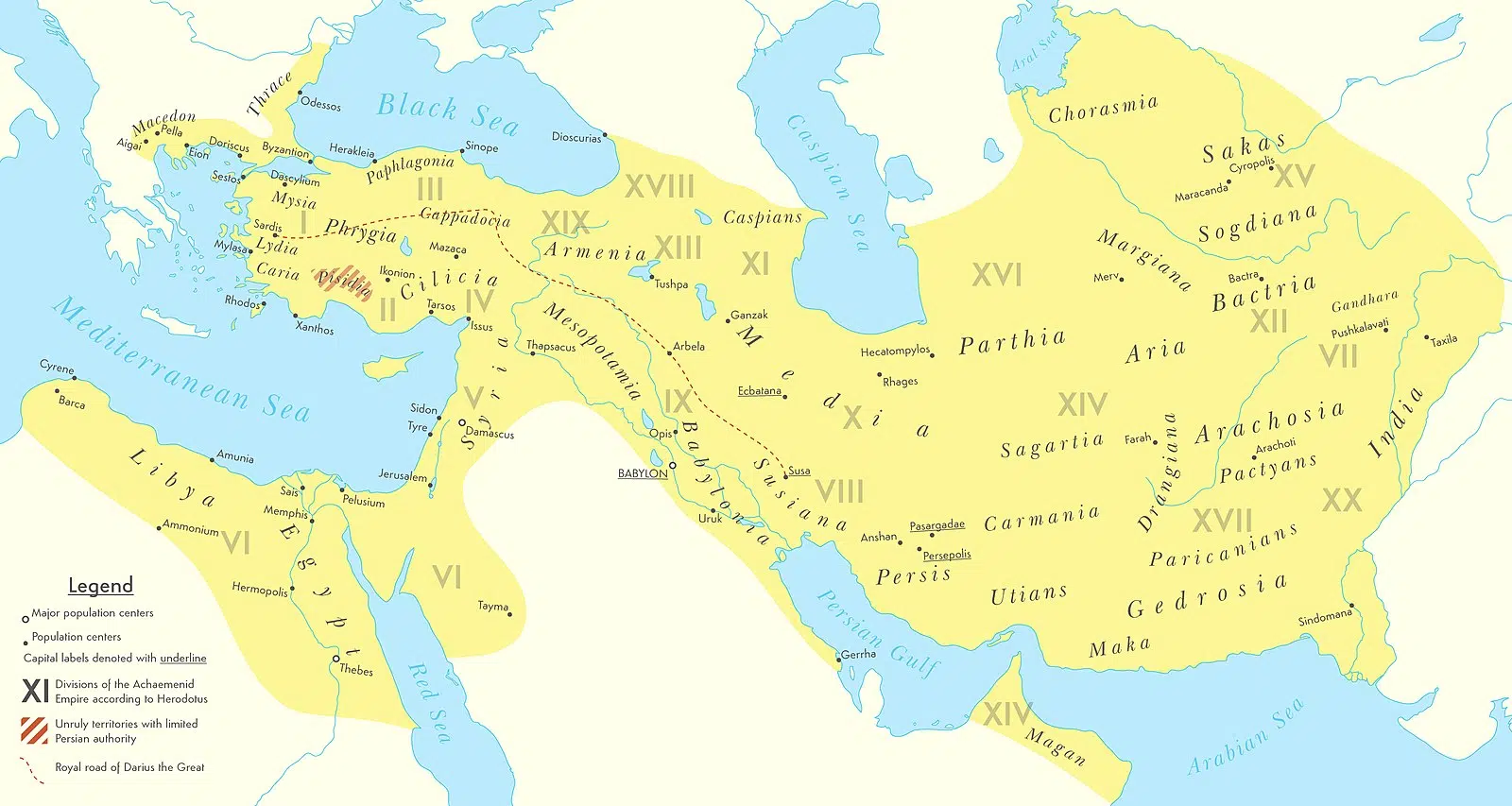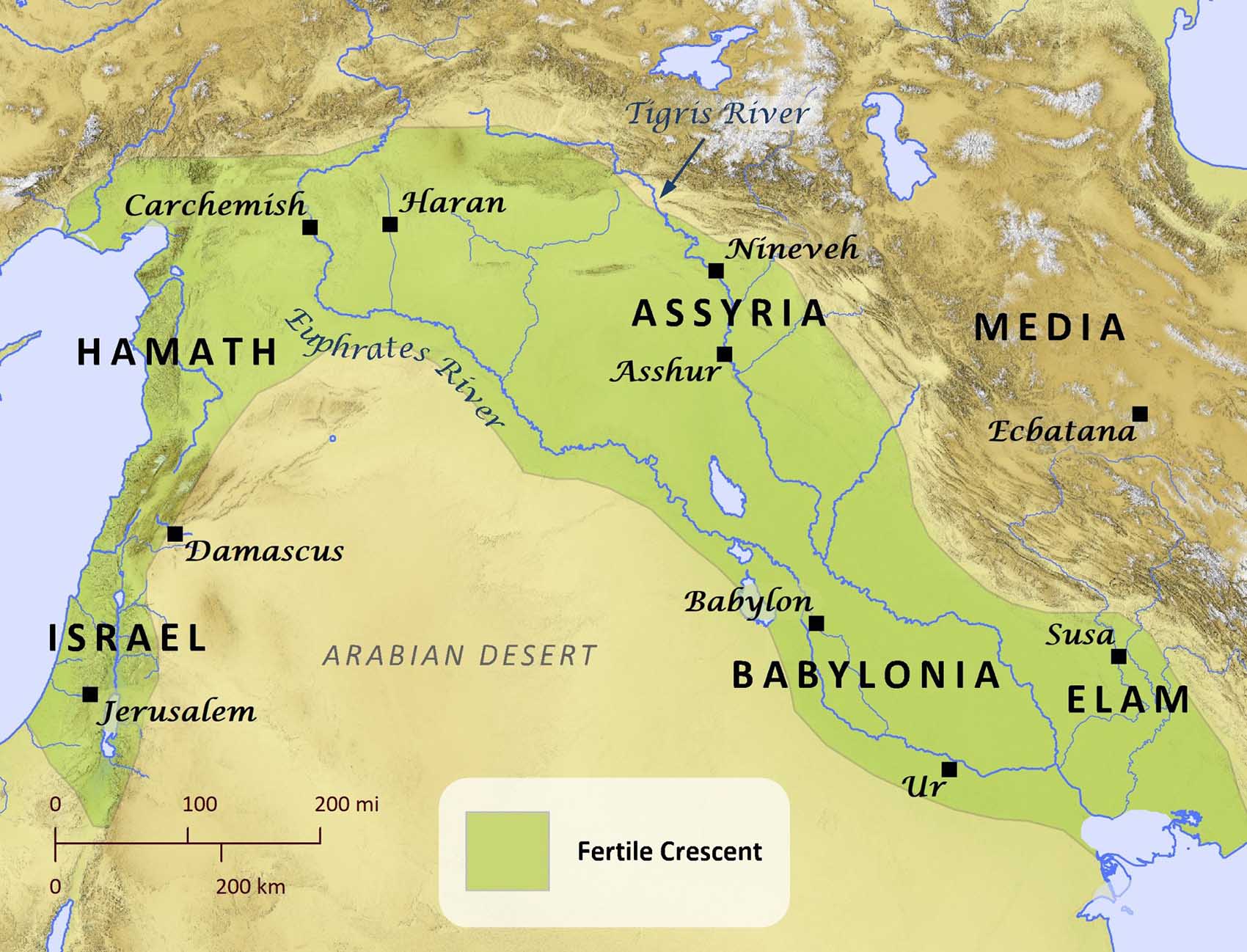Babylon is still the world power, but not for long. Belshazzar, grandson of Nebuchadnezzar, is in his third year of ruling. Daniel journeys to Susa, the capital of Elam, and sees a vision beside a canal.
During the third year when Belshazzar was king over Babylon, Daniel experiences another vision. Belshazzar was Nebuchadnezzar’s grandson; it was he who saw a hand writing on the wall during a feast, which told him that his reign was over, on the night the Babylon Empire fell to the Medo-Persians (Daniel 5:5). But the chapters in Daniel are not presented chronologically, since here in Daniel 8, Belshazzar is still king, and Babylon is still the great power of the ancient world, though it is a kingdom in decline.
Daniel notes that this vision was subsequent to the one which appeared to him previously. He is referring to the vision which took place in “the first year of Belshazzar king of Babylon” (Daniel 7:1). We are now in the third year of Belshazzar’s reign. That vision from the first year of Belshazzar’s reign showed Daniel four beasts coming out of the sea, representing the Babylonian empire and the empires which would come after. At the end of the vision, God judged the final empire and its blasphemous king by throwing them into a fire of judgment. God then established His own kingdom on earth for His people and chose a King to rule it forever. That vision follows the pattern of Nebuchadnezzar’s dream in Daniel 2, where a statue is shown depicting the great empires of man, which are ultimately done away with by God, who establishes His eternal kingdom on earth.
Daniel’s vision here in Chapter 8 also shows kingdoms at war, and prophecies about the same kingdoms that are to come. But it focuses on a specific king who will persecute the Jewish people in the future. Daniel writes that he looked into the vision, and while he was looking he was in the citadel of Susa, which is in the province of Elam.
Susa (also known as Shushan) was the capital of Elam. Elam was formerly an empire in its own right, a region east of Babylon and Sumer, part of modern day Iran. Elam is first mentioned in the Bible as the son of Shem, son of Noah (Genesis 10:22). Susa was where the Persian king Xerxes (Ahasuerus) resided during the Book of Esther (Esther 1:2) —see map in Additional Resources on the sidebar.
Daniel specifies where he was in the area of Susa, repeating that he looked in the vision and was himself beside the Ulai Canal. It is unknown what the Ulai Canal was, possibly part of the Karkeh River twenty miles outside of Susa, or perhaps a man-made canal lost to history.
Where Daniel was when he had the vision does not appear to be relevant. Daniel might mention it to clarify his current station on this earth, living in exile as a servant of the Babylonian empire, when God sent this vision. He might also mention this specific detail in order to emphasize that it was an actual event that occurred at a place and time in history.
Daniel is contextualizing this actual thing that happened to him. There is no pretense of importance about Daniel, he does not promote himself as a prophet or a seer. These visions happen to him unasked for and unannounced, and are clearly not enjoyable experiences (Daniel 8:27). But Daniel was the man to whom God chose to reveal these events of the future, near and far, many times (Daniel 2, Daniel 7, Daniel 9, Daniel 11). He was faithful to record each of them, no matter the distress they caused.
Biblical Text
In the third year of the reign of Belshazzar the king a vision appeared to me, Daniel, subsequent to the one which appeared to me previously. 2 I looked in the vision, and while I was looking I was in the citadel of Susa, which is in the province of Elam; and I looked in the vision and I myself was beside the Ulai Canal.
Check out our other commentaries:
-
Acts 3:17-21 meaning
Peter says that Jesus fulfilled the prophecies of the Old Testament, that He was destined to suffer. He calls on his Jewish audience to repent...... -
Hosea 2:2-5 meaning
The LORD urges His children to denounce their mother for her shameful behavior, lest they follow her and fall under the same judgment that awaits...... -
Matthew 20:17-19 meaning
As Jesus and His disciples are about to go to Jerusalem, He pulls them aside to remind them about His arrest, trial, crucifixion, and resurrection...... -
Genesis 24:62-67 meaning
Isaac is in the southern desert of Canaan. He sees the ten camels returning. Rebekah sees him from a distance and asks who he is....... -
Daniel 2:17-23 meaning
Daniel seeks wisdom from God and gives thanks when it is given to him.......




